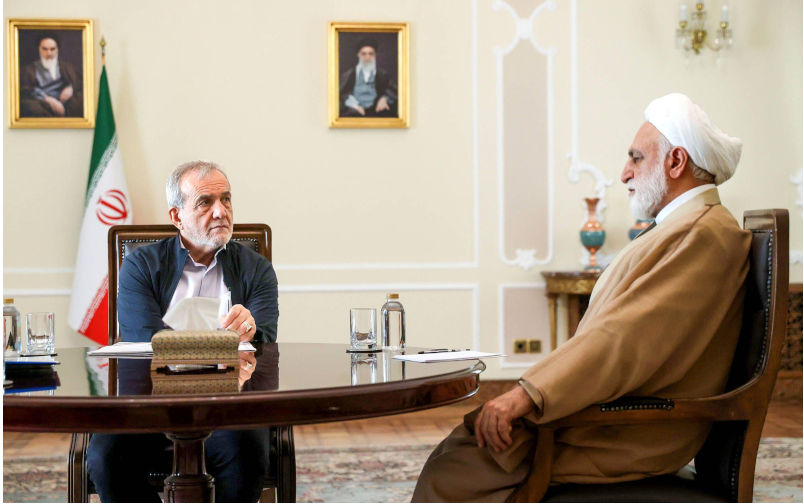Regime change and blowback in Iran
June 24, 2025
According to US political scientist Chalmers Johnson, in the 1950s the CIA coined the term “blowback” to refer to “the unintended and unexpected negative consequences of covert special operations that have been kept secret from the American people and, in most cases, from their elected representatives".
For the US, the classic example of “blowback” occurred in Iran after the CIA and MI6 overthrew the democratically elected prime minister Mohammad Mossadegh in 1953 and reinstalled the Shah (see seminal accounts by Ervand Abrahamian and Stephen Kinzer).
The coup thwarted attempts to nationalise Anglo-Persian Oil (later BP) and enabled US oil companies to grab 40% of the industry. However, it also produced a number of unexpected and disastrous consequences, both for the people of Iran and the US. The coup destroyed a secular, modernising government and ushered in 25 years of brutal repression by SAVAK — the regime’s secret police — paving the way for Islamic fundamentalism to become the dominant form of political opposition in the country.
After the Shah’s repression drove political opposition into the mosques of the country, “blowback” climaxed in January 1979 when Ayatollah Khomeini and the mullahs came to power in a political and theocratic revolution which has proved catastrophic for American interests in the region ever since.
In light of such a monumental failure, greater circumspection by Washington might have been expected before serious thought was given to planning a sequel.
Nonetheless, according to Newsweek, “the CIA and DIA have war-gamed the likely consequences of a US pre-emptive strike on Iran’s nuclear facilities” for more than two decades. The problem, according to the magazine, is that “no-one liked the outcome. As an Air Force source tells it, ‘the war games were unsuccessful at preventing the conflict from escalating’."
This follows similar war-gaming in 2003 when the scenarios were even worse for the Pentagon. During that simulation, the Iranians sank most US warships patrolling the Gulf in the first few days of the virtual conflict, effectively delivering a swift victory to Tehran.
These results are unlikely to deter those in Washington and Israel who have long been determined to reverse the Iranian revolution for which their venality had earlier helped to prepare the ground. The die was cast when president George W. Bush undermined reformist elements within the Iranian polity by inexplicably branding the country part of an “axis of evil” in January 2002.
Unverified and contradictory intelligence reports today warning that Iran will imminently weaponise its civilian nuclear program is but another pretext for regime change in Iran. The first step in this plan was Israel’s illegal and unprovoked attack last week — bizarrely described in Western capitals as “self-defence” — which was designed to both sabotage the possibility of a nuclear deal between Tehran and Washington (some kind of JCPOA2) and to punish Iran for supporting the Palestinians in Gaza.
However, after 45 years of theocracy in the country and with surprisingly little idea of what would replace it, the West’s grand ambition of yet another change of regime is likely to prove more elusive: as in Iraq, it would require “boots on the ground” to accomplish the task and no Western governments are likely to send their troops into Iran. Those in Washington and Tel Aviv, who seek to shape the political destiny of humanity in the Middle East, are in for surprises and disappointment.
Cynical, promiscuous and unsuccessful interventions have long been a feature of US foreign policy regardless of the president, and they have almost always left the world more dangerous and uncertain while enhancing anti-Americanism. They inevitably produce too many unexpected consequences and insoluble problems, including terrorism, insurgency, resistance and anger. As the war historian Gabriel Kolko wrote, a vainglorious and limitless ambition to rule the world is doomed to failure, regardless of the state. Wars usually go awry and become uncontrollable.
These lessons should be front of mind now that, at Israel’s insistence, President Trump has bombed Iran’s nuclear sites. Washington may believe that it has discharged its responsibility to the Netanyahu Government but the wider consequences for US assets across the region, including soaring oil prices, the closure of shipping lanes in the Strait of Hormuz and the fragility of US satraps, could be felt for a long time: this is an escalation and Iran will exercise its right to self-defence by retaliating.
The first casualty will be any residual trust Tehran had for Washington’s word: backchannels will be shut down and the attacks will be a fatal blow for reformers in Tehran pushing for rapprochement with the West.
The second will be Trump’s pledge to his MAGA base that he is an anti-war Republican. Many of his supporters will feel betrayed that he put Benjamin Netanyahu’s political future ahead of pledges to keep the US out of foreign “forever wars” and put America first. The base is likely to split further as Israel pushes for the total destruction of Iran’s missile program and, ultimately, regime change – neither of which it can accomplish without additional US involvement.
A third consequence of the attack will be to encourage the Iranians to build nuclear weapons, learning from the examples of North Korea, Pakistan and India, that only “nukes” can deliver an ultimate deterrent to enemies and aggressors. As the conservative realist scholar Kenneth Waltz wrote in 2012, a nuclear-armed Iran is the scenario “most likely to restore stability to the Middle East".
Finally, for allies of the US such as Australia, the time for reviewing their attachment to Washington’s reckless and aggressive interventions around the world is overdue. A cost-benefit analysis of the relationship needs to be undertaken before open-ended commitments such as AUKUS bind us permanently to a country which consistently leaves the world less stable and more dangerous for humanity.
The views expressed in this article may or may not reflect those of Pearls and Irritations.


